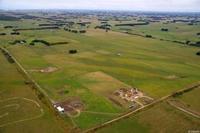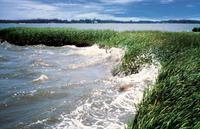-
On-demand emergency responder training
New service allows fire, police, EMS, and military to provide their training video library through an on-demand delivery to any television; the service allows responders to select a video through a graphical menu on the television screen and then play, pause, restart, rewind or fast forward the video
-
-
UMD, Lunarline partner on cybersecurity
The University of Maryland Cybersecurity Center will partner with Lunarline Inc. on cybersecurity education, research, and technology development
-
-
Depleted gas reservoirs used for carbon storage

One way to keep CO2 from accumulating in the atmosphere is to bury (or “sequester”) it under ground; a demonstration project in Australia verified that depleted natural gas reservoirs can be used for geologic carbon sequestration; the carbon sequestration approach involves pumping CO2 deep underground for permanent storages
-
-
Tails help leaping lizards – and robots – stay in control

A new study examined how lizards manage to leap successfully even when they slip and stumble; the researchers found that lizards swing their tails upward to prevent them from pitching head-over-heels into a rock; the research pushed the boundaries of control in robotics in an area researchers call inertial assisted robotics
-
-
U.S. faces new wave of invasive species

New study warns that the earlier onset of spring, warmer winters, economic globalization, and increased trade with emerging economies in Asia and Africa will see the United States face a significant new wave of invasive plant introductions; at least forty-two emerging U.S. trade partners – among them Thailand, Egypt, Saudi Arabia, Ecuador, Argentina, and several in equatorial Africa — are poised to export new nursery plant varieties to the United States
-
-
Texas drought – no end in sight

Residents across Texas are continuing to struggle with one of the state’s worst natural disasters in history; far from a singular event, Texas is experiencing a crippling drought with record low rainfall for the 2011
-
-
Researchers: new forms of torture leave “invisible scars”
Use of torture around the world has not diminished but the techniques used have grown more complex and sophisticated; a new study suggests that these emerging forms of torture, which include various types of rape, bestiality, and witnessing violent acts, are experienced by people seeking asylum in the United Kingdom
-
-
Using bacteria to detect toxins in water
Biologists and bioengineers at UC San Diego have created a living neon sign composed of millions of bacterial cells that periodically fluoresce in unison like blinking light bulbs; because bacteria are sensitive to many kinds of environmental pollutants and organisms, the scientists believe this approach could be used to design low cost bacterial biosensors capable of detecting an array of heavy metal pollutants and disease-causing organisms
-
-
Laws of traditional physics would foil Santa's effort to carry out mission
Santa has 31 hours to visit 378 million Christian children; at the rate of 3.5 children per household, and assuming at least one good child per home, this comes to 108 million homes; if each child receives no more than a medium sized Lego set (two pounds), the sleigh would be carrying more than 500 thousand tons, not counting Santa himself; Santa would thus need at least 360,000 Reindeer to pull the sleigh; since Santa must visit 108 million homes in 31 hours, he will have to travel at 650 miles per second — 3,000 times the speed of sound; at that speed, the lead pair of Reindeer would absorb 14.3 quintillion joules of energy per second each and vaporize — indeed, the entire Reindeer team would be vaporized within 4.26 thousandths of a second; Santa himself would be subjected to forces of 17,500 Gs; a 250 pound Santa (which seems ludicrously slim) would be pinned to the back of the sleigh by 4,315,015 pounds of force, and be crushed
-
-
String theory explains Santa Claus
Calculations maintain that the laws of physics should prevent Santa Claus from delivering all his gifts and that Santa would burn up in the atmosphere if he tried; the Norwegian Internet magazine, forskning.no, has put together a team of four top researchers to look into the case; the panel’s conclusion is clear: Santa can do the job and Christmas is saved!
-
-
SF Bay wetlands losing battle against sea level rise

San Francisco Bay’s tidal marshes protect coastlines against flooding, provide nursery areas for commercial fisheries and filter pollutants from seawater and the atmosphere; these marshes may face a grave threat from sea level rise in the next century
-
-
Cleaning toxins from the oilsands
Oilsands development uses a vast amount of water and even though it’s recycled multiple times, the recycling concentrates the toxins and metals leftover from extracting and upgrading the bitumen, resulting in controversial tailings ponds that are a significant risk to the environment; scientists offer a way to make oilsands exploitation cleaner
-
-
Flying robots imitate honey bees in complex maneuvers

Scientists have developed a novel autopilot that guides aircraft through complex aerobatic maneuvers by watching the horizon as a honey bee does
-
-
Lawmakers make steep cuts to DHS research budget
Over the weekend the Senate approved an omnibus spending bill that would result in deep cuts to DHS’ research and development arm
-
-
Creating drought-tolerance in crops
Researchers’ discovery creates new blueprint for engineering drought tolerant crops; the researchers found a way to rewire this cellular machinery to heighten the plants’ stress response — a finding that can be used to engineer crops to give them a better shot at surviving and displaying increased yield under drought conditions
-
More headlines
The long view
New Technology is Keeping the Skies Safe
DHS S&T Baggage, Cargo, and People Screening (BCP) Program develops state-of-the-art screening solutions to help secure airspace, communities, and borders
Factories First: Winning the Drone War Before It Starts
Wars are won by factories before they are won on the battlefield,Martin C. Feldmann writes, noting that the United States lacks the manufacturing depth for the coming drone age. Rectifying this situation “will take far more than procurement tweaks,” Feldmann writes. “It demands a national-level, wartime-scale industrial mobilization.”
How Artificial General Intelligence Could Affect the Rise and Fall of Nations
Visions for potential AGI futures: A new report from RAND aims to stimulate thinking among policymakers about possible impacts of the development of artificial general intelligence (AGI) on geopolitics and the world order.
Smaller Nuclear Reactors Spark Renewed Interest in a Once-Shunned Energy Source
In the past two years, half the states have taken action to promote nuclear power, from creating nuclear task forces to integrating nuclear into long-term energy plans.
Keeping the Lights on with Nuclear Waste: Radiochemistry Transforms Nuclear Waste into Strategic Materials
How UNLV radiochemistry is pioneering the future of energy in the Southwest by salvaging strategic materials from nuclear dumps –and making it safe.
Model Predicts Long-Term Effects of Nuclear Waste on Underground Disposal Systems
The simulations matched results from an underground lab experiment in Switzerland, suggesting modeling could be used to validate the safety of nuclear disposal sites.
